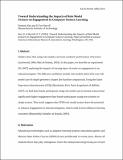| dc.contributor.author | Kao, Dominic | |
| dc.contributor.author | Harrell Jr, Douglas Alan | |
| dc.date.accessioned | 2018-01-12T19:04:29Z | |
| dc.date.available | 2018-01-12T19:04:29Z | |
| dc.date.issued | 2016-04 | |
| dc.identifier.uri | http://hdl.handle.net/1721.1/113092 | |
| dc.description.abstract | Studies show that using role models can boost academic performance of learners (Lockwood, 2006; Marx & Roman, 2002). In this paper, we describe an experiment (N=1067) exploring the impacts of varying types of avatar on engagement in an educational game. The different conditions include role models and (c) the non-role model case of simple geometric shapes (for baseline comparison). Using the Game Experience Questionnaire (GEQ) (IJsselsteijn, Kort, Poels, Jurgelionis, & Bellotti,
2007), we find that female participants using role model case (scientist avatars) had significantly higher engagement than female participants using non-scientist or shape avatars. This result suggests that STEM role model avatars have the potential to enhance engagement in educational games, which could in turn influence learning outcomes (Blumenfeld, Kempler, & Krajcik, 2005). | en_US |
| dc.description.sponsorship | National Science Foundation (U.S.) (STEM+C Grant 1542970) | en_US |
| dc.description.sponsorship | Natural Sciences and Engineering Research Council of Canada | en_US |
| dc.language.iso | en_US | |
| dc.publisher | American Educational Research Association | en_US |
| dc.relation.isversionof | http://www.aera.net/Publications/Online-Paper-Repository | en_US |
| dc.rights | Creative Commons Attribution-Noncommercial-Share Alike | en_US |
| dc.rights.uri | http://creativecommons.org/licenses/by-nc-sa/4.0/ | en_US |
| dc.source | Kao | en_US |
| dc.title | Toward Understanding the Impacts of Role Model Avatars on Engagement in Computer Science Learning | en_US |
| dc.type | Article | en_US |
| dc.identifier.citation | Kao, Dominic and D. Fox Harrell. "Toward Understanding the Impacts of Role Model Avatars on Engagement in Computer Science Learning." 2016 2016 American Educational Research Association Conference, 8-12 April, 2016, Washington, DC, American Educational Resource Association, 2016. | en_US |
| dc.contributor.department | Massachusetts Institute of Technology. Department of Electrical Engineering and Computer Science | en_US |
| dc.contributor.approver | Kao, Dominic | en_US |
| dc.contributor.mitauthor | Kao, Dominic | |
| dc.contributor.mitauthor | Harrell Jr, Douglas Alan | |
| dc.relation.journal | 2016 American Educational Research Association Conference | en_US |
| dc.eprint.version | Author's final manuscript | en_US |
| dc.type.uri | http://purl.org/eprint/type/ConferencePaper | en_US |
| eprint.status | http://purl.org/eprint/status/NonPeerReviewed | en_US |
| dspace.orderedauthors | Kao, Dominic; Harrell, D. Fox | en_US |
| dspace.embargo.terms | N | en_US |
| dc.identifier.orcid | https://orcid.org/0000-0002-7732-6258 | |
| dc.identifier.orcid | https://orcid.org/0000-0003-4992-2201 | |
| mit.license | OPEN_ACCESS_POLICY | en_US |
